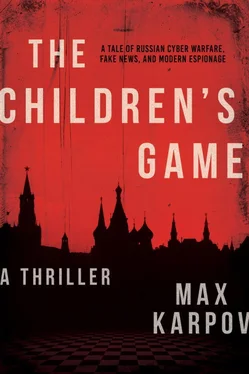The interruption of their trip stirred other memories, as well, of the sudden breakup of Anna’s marriage six years ago. She still faulted herself at times for that: for being too career-minded and not making enough room for family, for failing to anticipate that her husband couldn’t deal with her becoming a public figure, or that he’d ever be unfaithful.
Greece had been Anna’s idea. A chance to shut out the noise in their lives for a few days. She never imagined she would be returning to Washington alone, with this sort of apphrension in her head.
“ Mom! ” David Carpenter, Anna’s twenty-four-year-old son, reached out and squeezed her arm, breaking her reverie. She’d almost walked right past him. “I was waving for, like, five minutes. Didn’t you see me?”
“No, I guess I didn’t.” Anna smiled, feeling a rush of affection for her tall, earnest son. He looked sharp in jeans and a crisp blue dress shirt, watching her with his dark, inquisitive eyes. “Sorry, honey.” She rose on her tiptoes to kiss his cheek. “Guess I’m a little jet-lagged.”
David took her carry-on and began to walk, staying a step ahead of his mother, deftly dodging the pedestrian traffic as if it were important to be first to baggage claim. Anna’s son was six two and a half—six inches taller than she was, and still something of a “string bean,” as people used to call him (her staff had labeled him “Jonah” once, thinking he resembled the character on Veep ). But he carried himself with a professional assurance now, which seemed to have grown in proportion to his career. After floundering for a year or so during the divorce, David had found his calling in computers, without a lot of guidance from his mother—and none from his father, who’d run off to California with his much-younger girlfriend. Success had given her son ambition, rather than the other way around, and he’d risen quickly from an IT tech to a “bug hunter” to a “cybersecurity analyst.” He worked now for one of D.C.’s largest threat-intel firms, monitoring the dark web for terrorist and cybercrime activity, with clients that included defense contractors and the federal government. David’s career had given him an anchor and a sense of purpose he’d never known growing up. And it had made his mother proud.
As they approached baggage claim, Anna noticed a two-man TSA VIPR team in body armor walking their way carrying semiautomatic rifles. Something was different at Dulles tonight, she could see. She waited until David hoisted her bag from the carousel before placing a call to Ming Hsu, her chief of staff. “I’m back,” Anna said, following her son to the garage.
“Welcome,” Ming said, in her factual manner.
“What’s going on at the airport? I’m at Dulles.”
“Nothing specific. Heightened chatter. I’ll have something for you in the morning.” Anna had known Ming for more than ten years, and understood what she was saying: Go home, get a good night’s sleep. If you’re going to worry, save it for morning. She clicked off and hurried to catch up to David. For the past several weeks, signals intelligence had suggested that Russia was preparing some sort of military move in the Baltics. At the same time, there’d been increased chatter among known Russian agents within the States. As a member of the Senate Select Committee on Intelligence, Anna had been briefed on both issues before leaving for vacation. But tonight was the first she’d heard anything about US airports.
David, she saw, had stopped in the parking garage, setting her bags down behind a smart car. “This is your car? ” she said. “When did you get this? ”
“It’s Malika’s.” He pointed a key fob and the hatch popped open. “Don’t worry, it’s safe.”
Anna’s concern was less about safety than about how David, she, and the luggage were all going to fit. But her bags went right in. He shut the hatch as if he’d done this many times. Malika was David’s first serious girlfriend, a woman about half his size and far more outgoing, but for mysterious reasons, they were a good match. He’d met her at work last year, and they’d recently moved into a house together out in the Maryland suburbs.
“Careful,” Anna said as he lurched into the aisle lane. It was the first time she’d been in a smart car and it didn’t feel safe at all. It felt as if two-thirds of the car were missing.
“We get a lot of clown car jokes,” David said. An SUV going much too fast swerved around them, horn blaring, as he pulled into the traffic lane. “Jerk,” he muttered, glancing in his side mirror to see if anything else was coming.
They rode in silence out onto I-66, David driving a little fast. Anna finally relaxed enough to check her phone for messages and news. Besides the ongoing political wars between Democrats and Republicans, there were more tensions with Russia: in the Baltic Sea, a Russian Su-24 fighter jet had flown within sixty feet of a British Navy ship. There was also a vague report about a plan to attack American universities in the fall, with a “possible Russia link.” But once she got past the headline, Anna saw that the “plan” amounted to nothing more than an email exchange between two college students in North Dakota, one of them born in Russia.
“So?” David said, as if they’d arrived in a safety zone. “What’s going on, Mom?”
“How do you mean?”
“You’re back three days early. Chris isn’t with you. There were VIPR teams at the airport. There’s been a spike in troll activity and some strange cyber hacks over the past two days—”
Anna turned off her phone. “I told you, Chris was called away on business.” They rode in silence for another mile, Anna watching the mirrored office buildings, the gauzy afterglows of sunset. “But tell me about that,” she said. “A ‘spike in troll activity’?”
“Yeah.” David glanced at his mother. “Just—some weird stuff coming across.”
“Okay. And could you be a tad more specific?”
David smiled. He cleared his throat unnecessarily, a habit from his teenage years. Sometimes, Anna learned things by comparing notes with her son. But it usually took a little prodding. “The intel is that Russia is planning something against NATO, right? Or against us?” Anna allowed a small “mmm-hmm,” to keep him going. “Isn’t that why there were VIPR teams at the airport?”
“Maybe,” she said. “What’s the ‘weird’ part?”
“The weird part is there’s tons of online activity all of a sudden saying the opposite.”
“Really. The opposite being what—that we’re planning something against Russia? ”
“Yeah.” He gave her an appraising glance. “You don’t know about that?”
“No, I guess I don’t.” Anna wondered if this was why David had seemed so anxious to pick her up at the airport tonight. “What sites are we talking about?”
“Military websites at first. But it’s all over Twitter now.”
“Think you could show me?”
“Sure. If you want.”
Anna knew that Russia’s so-called troll factories churned out thousands of phony Internet posts each day, flooding Western news sites with pro-Russia and anti-Western opinions, along with fabricated stories promoting Moscow’s agendas. The government also sponsored automated bot programs that repackaged pro-Russia opinions and had managed to plant malware on systems throughout the United States. The Kremlin actively recruited freelancers—some of them students, some from the cybercrime underworld—for this work, for what were euphemistically called “science squads.” Washington didn’t have an equivalent program or effective countermeasures, and there were moral and ethical questions about how far the US should go in developing them. For years—as a congresswoman and as an intelligence analyst at the State Department—Anna had pushed for a stronger legal framework for cyberwarfare, without much success.
Читать дальше












